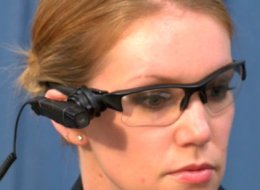
The Denver Police Department is looking to equip 800 officers with body cameras in 2015.
In an interview with the Denver Post, Denver Police Chief Robert White said that body-mounted cameras would serve as an impartial record, protecting those who make legitimate complaints, and shielding officers from false claims of excessive force.
“Citizens should know officers are being held accountable,” White told the newspaper. “The only officers who would have a problem with body cameras are bad officers.”
The $1.5 million program still requires approval of the city council.
Last year, police in Denver began evaluating the cameras — which are worn on glasses or lapels — in a trial run focused on downtown Denver. The pilot program is part of a study conducted by Cambridge University, with funding from Taser International.
Patrol officers who wear cameras download video to a cloud storage system after their shift.
A body camera program in Rialto, California, a small city near Los Angeles, coincided with huge declines in both complaints against cops and incidents involving force, according to the Guardian:
After cameras were introduced in February 2012, public complaints against officers plunged 88 percent compared with the previous 12 months. Officers’ use of force fell by 60 percent.
The recent violence in Ferguson, Missouri, has led to a renewed call for body cameras on cops. Greg Hallgrimson, police chief in the small town of Greenwood, Missouri, called the cameras “one piece of equipment I would never want to do without.”
On Wednesday, Sen. Claire McCaskill, D-Mo., said that body cameras should be mandated by departments as a prerequisite for receiving federal funds.
Regarding the program in Rialto, the American Civil Liberties Union of Southern California — a frequent critic of abuse of force — said that if videos are kept private and deleted regularly (unless used in a trial), the gains for accountability would outweigh privacy concerns.















